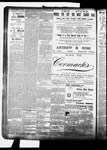On behalf of Dr. W. F. Eastwood, Claremont, Messrs. Dickson & Johnston, Toronto, have notified The Chronicle of their intention to take action against us for libel on following sentences printed in an editorial in this journal of March 27th last.
“He (Alger) tried to place $17,000 life insurance on his dying wife whom he knew to be in the last stages of consumption. He applied for big risks on his daughters life, his own, and rushed his hired men into taking risks. He did a land office business, and for a time was the hub of the mighty graveyard insurance fraud’s which have come to light in Pickering Township. The agents vied with each other in catering to his rapacious desire for policies, while the doctors wrote down and certified to whatever answers he deemed necessary to carry out his schemes. They are all trying to get out of it now, by hook or by crook, and it looks as if he will have to suffer for all the gang as well as himself.”
“As to the part taken in these insurance vagaries and frauds by Dr. Francey, Dr. Eastwood and Henry Trull, we have their own admissions,and we are able to form strong opinions. A jury of 12 found Alger guilty, but the greater jury, the public, knows that he should not have been sent to penitentiary alone. With two doctors from different points swearing in court that they believe it is perfectly honorable to make false reports to deceive those who are dying and went to rob an insurance company with their last breath, it is no wonder Pickering Township is said to be reeking with graveyard insurance.”
Messers Dickson & Johnston do not point out the particular statements to which they take exception, and we are only able to analyze the matter from conjecture, which we shall do as fairly as possible. In the first paragraph it is stated that the doctors wrote down and certified to whatever answers Alger deemed necessary to carry out his scheme and that Alger and all the rest are trying to get out of it by hook or crook. Alger tried to get out of it by denying everything. Francey by running Queen’s evidence. Dr. Eastwood, by bringing to light his confidential letters to the London & Lancashire Insurance Company, exposing the whole fraud and informing the company that his examination of Mrs. Alger was incorrect. In an editorial summary of the case on March 20th, The Chronicle, stated that Dr. Eastwood at once warned the L. & L. Company that a fraud was being attempted, and not to accept his examination as final. We have never tried to make it appear that Dr. Eastwood sought to defraud a company or anybody else, but that he wrote down such answers as led Alger to expect this would be the result. In our comments of March 27th, we assumed that our readers knew the facts, which we had then fully reported in The Chronicle, and knew that Francey was escaping penitentiary by turning Queen’s evidence, which clearly explains why we held that Alger should not have gone to penitentiary alone. We think so still, and Francey admitted so repeatedly.
As to the second paragraph quoted we have Dr. Eastwood’s admission, and that he made an untrue examination we have also a statement of his motive, which was to protect the insurance company. He also admits that he believes a doctor may properly mislead a person who is unfit for insurance where practice is at stake, provided he makes a private report to the insurance company stating the facts. It may be professional expedient to do so, but we cannot subscribe to such a code of morals. Judge Falconbridge dissented from Dr. Eastwood’s line of reasoning on this point. We have Dr. Francey’s admission that he did not make private reports to the companies about his crooked
examinations, and that Mrs. Alger was deceived by it, and we have also Dr. Eastwood’s that he and Alger came to an understanding as to the untrue nature of his report, whilst Mrs. Alger was outside the room.
We neither in the articles complained of nor any other article charged any intent or desire to commit fraud on the point of Dr. Eastwood, and have all the times given prominence to the fact that he claimed to be protecting the company against fraud. The files of The Chronicle will satisfy any person on this point. In the whole of the article complained of, we had but one end in view: that of commenting on the Alger Case, as it appeared from the evidence brought out at the trial in such a way as would tend to do away with the shady class of insurance deals which are so much talked of, and had no desire to make any man’s case look unnecessarily bad.


